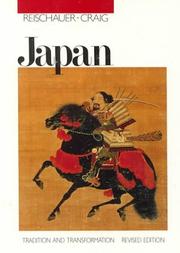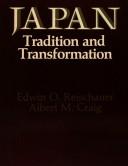| Listing 1 - 10 of 29 | << page >> |
Sort by
|
Book
ISBN: 0674128508 Year: 1961 Publisher: Cambridge (Mass.) : Harvard university press,
Abstract | Keywords | Export | Availability | Bookmark
 Loading...
Loading...Choose an application
- Reference Manager
- EndNote
- RefWorks (Direct export to RefWorks)
Chōshū-han (Japan) --- Japan --- History. --- History
Book
Year: 1961 Publisher: Cambridge, Mass. Harvard University Press
Abstract | Keywords | Export | Availability | Bookmark
 Loading...
Loading...Choose an application
- Reference Manager
- EndNote
- RefWorks (Direct export to RefWorks)
Book
ISBN: 9780674271630 Year: 2009 Publisher: Cambridge, MA
Abstract | Keywords | Export | Availability | Bookmark
 Loading...
Loading...Choose an application
- Reference Manager
- EndNote
- RefWorks (Direct export to RefWorks)
Digital
ISBN: 9780674271630 Year: 2009 Publisher: Cambridge, Mass. Harvard University Press
Abstract | Keywords | Export | Availability | Bookmark
 Loading...
Loading...Choose an application
- Reference Manager
- EndNote
- RefWorks (Direct export to RefWorks)

ISBN: 0395496969 9780395496961 Year: 1989 Publisher: Boston Houghton Mifflin
Abstract | Keywords | Export | Availability | Bookmark
 Loading...
Loading...Choose an application
- Reference Manager
- EndNote
- RefWorks (Direct export to RefWorks)
Japan --- Japon --- History --- Histoire --- J3300 --- J4000 --- Japan: History -- general histories --- Japan: Social sciences in general, social history --- History.

ISBN: 0868612979 Year: 1979 Publisher: Sydney : Allen and Unwin,
Abstract | Keywords | Export | Availability | Bookmark
 Loading...
Loading...Choose an application
- Reference Manager
- EndNote
- RefWorks (Direct export to RefWorks)
Book
ISBN: 9781350096622 9781350096615 Year: 2019 Publisher: London Bloomsbury
Abstract | Keywords | Export | Availability | Bookmark
 Loading...
Loading...Choose an application
- Reference Manager
- EndNote
- RefWorks (Direct export to RefWorks)
During the sweeping changes taking place in 19th century Japan, no thinker was more important than Fukuzawa Yukichi (1835-1901). Born into a low-ranking samurai family, he traveled to Nagasaki at age nineteen to study Dutch. In 1858, he was sent to Edo to teach Dutch to domain students. In his spare time he taught himself English using a Dutch-English dictionary. Two years later, he was appointed a translator of diplomatic documents at the shogunal office of foreign affairs. In 1862, he founded a school that is now Keio University. Eager to introduce Western history and ideas to the Japanese, he wrote a series of books, including the bestselling Conditions in the West (1866).In the late 1870s, he turned his attention to the prospects for parliamentary government in Japan. The central government was firmly in place and elective prefectural assemblies were about to be established. He wrote essays on the workings of such a system, drawing on his earlier travels abroad and his reading of de Tocqueville, John Stuart Mill, Walter Bagehot, and others. A realist and optimist, Fukuzawa assured his readers of the eventual success of parliamentary government in Japan. This book provides the first-English language translation of five essays that bear directly on the development of his thought and its legacy in Japanese culture.
Book
Year: 1983 Publisher: Tokyo Keio University
Abstract | Keywords | Export | Availability | Bookmark
 Loading...
Loading...Choose an application
- Reference Manager
- EndNote
- RefWorks (Direct export to RefWorks)
Book
Year: 1978 Publisher: Boston Houghton Mifflin
Abstract | Keywords | Export | Availability | Bookmark
 Loading...
Loading...Choose an application
- Reference Manager
- EndNote
- RefWorks (Direct export to RefWorks)
Book
ISBN: 4805304472 Year: 1990 Publisher: Tokyo : Charles E. Tuttle,
Abstract | Keywords | Export | Availability | Bookmark
 Loading...
Loading...Choose an application
- Reference Manager
- EndNote
- RefWorks (Direct export to RefWorks)
| Listing 1 - 10 of 29 | << page >> |
Sort by
|

 Search
Search Feedback
Feedback About UniCat
About UniCat  Help
Help News
News